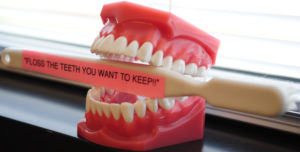Most people can relate to the stress of receiving the dreaded, but expected question while at the dentist: Have you been flossing? And for those who answer “no,” the shame of the neglect is lost almost as soon as you leave. But why is it so important to floss, and why are dentists always insisting their clients to do it?

Consequences of Skipping Flossing
What seems like a meticulous and unneeded task is very important to maintain healthy gums and teeth. Flossing helps remove the plaque and food that has lodged between your teeth or inside the pockets of your gums that the average toothbrush can’t reach. When you don’t floss, the plaque will build-up and cause major problems that can have disastrous consequences that stay with you for the rest of your life. These consequences include:
- Bad breath
- Bleeding gums
- Cavities/ tooth decay
- Gum disease
- Inflamed gums
- Loss of teeth
Gum Disease
Just as common as the question, “Have you flossed?” dentists will warn you about gum disease while telling you about the importance of flossing. But gum disease is such a broad topic that can be confusing to understand. Gum disease — also called periodontal disease — occurs when bacteria-filled plaque builds up in-between your teeth and around the lining of your gums. This build-up can lead to infections in the gums and bone, causing redness, swelling, and bleeding around your teeth.
Gum disease comes in various stages and can have a variety of negative effects. Here are the common forms of gum disease that not flossing can lead to:
Gingivitis
Gingivitis is the more docile phase of gum disease where the plaque build-up creates a bacterial film that hardens around your teeth, forming calculus. This hardened film will grow and infect your gums, causing gum inflammation, redness, and bleeding gums.
Periodontitis
Periodontitis occurs when gingivitis is untreated, and the calculus film grows over the entire surface of your teeth, extending below the gum lines. This growth will cause your gums to separate from your teeth and bone to form pockets, causing bleeding gums, swelling, and teeth misalignment and looseness.
In severe cases, periodontitis can advance as the pockets continue to deepen, and infection continues to spread. When untreated, advanced periodontitis can lead to severe bone loss, tooth decay, and eventually, tooth loss.
Gum Disease isn’t just limited to problems in oral hygiene— beyond causing bleeding gums, inflammation, tooth decay, and tooth loss, gum disease can also lead to heart problems and certain cancers. When you floss and keep up with your oral hygiene, you can avoid all of these consequences.
Dentist Insights: Tips For Preventing Gum Disease:
Believe it or not, it can be easy to prevent gum disease. As long as you maintain proper oral hygiene, then you should not have any problems with plaque build-up. When you take care of your gums, you also take care of your teeth. Here are a few dentist tips for easy prevention methods that you can add to or continue with your daily routine:
- Brush your teeth after every meal
- FLOSS!
- Quit smoking
- Routine dental cleanings
- Use fluoride toothpaste
- Use mouthwash
Visit Your Local Dentist
While most of these preventative measures can be done on your own, it is still important to regularly go to your local dentist for dental cleanings. The recommendation is to schedule cleanings every six months, and it is critical not to skip.
If your oral hygiene is suffering, your dentist can check for signs of gum disease that you might not be able to identify. By catching it in the early stages, your dentist can quickly work toward a treatment plan, and later help you create a preventative gum disease plan involving routine brushing, flossing, and cleaning.
Dr. Justin Russo of Russo Dentistry provides outstanding solutions that work with clients in the Durham, Raleigh, and Cary, North Carolina areas to help them prevent dental disease. He will help you take care of your teeth so that your smile can remain as beautiful as ever.

